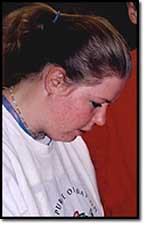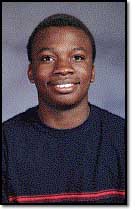Chelsey, a junior, has attended MNCS since the seventh grade. “I
knew I wanted to do a project on World War II because it interests
me,” explains Chelsey, “but history has always been hard
for me. I could never remember the facts and dates from the textbooks.”
Then she had an idea: “I’d read Anne Frank’s diary
and the diaries of others who’d lived through a certain historical
period. Why not create my own fictional diaries from World War II?
From there, the project just took off.”
Click
here for excerpts from one of the diaries,
for Chelsey’s journal about the project, and for her reflections
and performance rubric.
[Profiles of Learning addressed: History through Culture; Recorders
of History; Literary and Arts Creation and Performance; Reading,
Listening, and Viewing Complex Information; Diverse Perspectives]
 ERIC l
MODERN
PHYSICS
ERIC l
MODERN
PHYSICS
“What I did for my senior project was create a web site [called
Modern Physics Online]. I wanted to make the web site accessible to
anyone who had an interest in physics, so they wouldn’t have
to have any prior knowledge in physics. . . I also wanted to make
the web site interactive, more than just a bunch of reports put up
on the Internet.”
Eric traces his longstanding interest in physics to his reading
of science fiction. He chose modern physics for his senior project,
he says, because it was “broad enough to let me cover some
of the older areas of physics, such as relativity and quantum mechanics,
and also encompass some of the newer developments, such as high
energy particle physics and string theory.” Having graduated
from MNCS in spring 2002, Eric currently is pursuing a physics major
in college but remains undecided about a future career. For now,
his favorite area of physics is particle physics, because, as he
explains, “I like learning about how the world interacts on
the tiniest, tiniest scales.”
Click here
for excerpts from Eric’s exhibition (the presentation of his
senior project) and for his Modern Physics web site.
[Profiles of Learning addressed: Laws of Physics; History of
Science; Research Process; Reading, Listening, and Viewing Complex
Information; Technical Reading, Listening, and Viewing; Technical
Applications; Technical Writing; Academic Writing; Public Speaking]
TABITHA
l HENDERSON
CORNER DRUG STORE
 “If I’d never worked at Henderson Corner Drug, I would
have never learned... the difficulties and frustrations of waxing
a floor... not all customers are honest... a smile is the most important
thing to take to work... it’s possible to make 85 single cones
for a bus load of elderly people in about 35 minutes...”
“If I’d never worked at Henderson Corner Drug, I would
have never learned... the difficulties and frustrations of waxing
a floor... not all customers are honest... a smile is the most important
thing to take to work... it’s possible to make 85 single cones
for a bus load of elderly people in about 35 minutes...”
An eleventh grader at MNCS, Tabitha has put in more than 50 hours
per month for over two years working as a clerk at Henderson Corner
Drug. “I am very proud to work there,” says Tabitha, adding
that the store is one of only four remaining old-fashioned soda
fountains in Minnesota. With duties ranging from tending the cash
register, delivering prescriptions, and stocking shelves to scooping
ice cream and training new staff, Tabitha has learned important
life lessons. Chief among them, she says, is accepting responsibility
for her mistakes, then taking the initiative to make amends. She
plans another school project based on her work experience, this
time researching the history of the store.
Click here
for Tabitha’s final report about working at Henderson Corner
Drug, which includes lessons learned, comments from co-workers,
and her performance rubric.
[Profiles of Learning addressed: Occupational Experience; Community
Interaction; Individual and Community Health; Interpersonal Communication]
 ORE l
ALGEBRA
IN A FLASH
ORE l
ALGEBRA
IN A FLASH
“My project is basically about creating a math program to
help kids in Algebra One... I went through this math and I know how
it felt and I know where I got confused... I decided if I made a [computer]
program specific to the [Accelerated Plus] math system, that would
probably help a lot of kids.”
Ore based his algebra web site program on his own experiences
with the school’s computerized math program, Accelerated Plus,
in which students master a series of objectives through online practice
problems and tests. “I piled up notes from textbooks,”
Ore says, “and from everybody that teaches math, and from my
experience taking math,” to create a step-by-step program for
mastering each objective. “I think that would help kids a lot
more since it’s from a student.” Ore also surveyed 40
MNCS students to determine why kids don’t do projects on math.
“What are the problems they face, and why are those problems
there?” he asks, “Can I help? Can I improve the way math
is? Can I improve the way people perceive math?” Though Ore
graduated from MNCS in spring 2002 and has moved on to college,
his math program remains behind, in use by current algebra students
throughout the school.
Click
here for Ore’s web site, “Algebra One in a
Flash.”
[Profiles of Learning addressed: Algebraic Patterns; Math Research;
Technical Applications; Reading, Listening, and Viewing Complex
Information; Technical Reading, Listening, and Viewing; Technical
Writing; Interpersonal Communication; Market Research; Case Study]
TIM l
SCHOOL
REFORM THROUGH THE EYES OF A STUDENT
 “Before coming to MNCS, I thought of going into teaching.
Now I know I will. I feel I’ve learned so much about teaching
and learning. I feel I’m ahead of almost every undergrad who’s
thinking of going into teaching. I’ve experienced so much here,
thought so hard, feel so committed to teaching. I’ve built this
commitment through my work at MNCS. I guess you’d say I’m
a student of teaching and learning.”
“Before coming to MNCS, I thought of going into teaching.
Now I know I will. I feel I’ve learned so much about teaching
and learning. I feel I’m ahead of almost every undergrad who’s
thinking of going into teaching. I’ve experienced so much here,
thought so hard, feel so committed to teaching. I’ve built this
commitment through my work at MNCS. I guess you’d say I’m
a student of teaching and learning.”
Tim has made the school itself the focal point of much of his
work at MNCS—from projects entitled “Learning Levels and
School Improvement” and “Politics and Innovational Education”
to his work as a math tutor and his attendance at education conferences.
“I respect everything about this school and everything within
it,” Tim declares, recognizing the importance of MNCS’s
structures and policies not just to his own learning but for improving
the school he loves. He views himself as an advocate, now and in
the future, for the types of learning opportunities afforded him
at MNCS. “I speak with visitors to the school every chance
I get, which is my continued preparation and training for fighting
in the political forum.”
Click here
for
an interview with Tim, with links to his reading list, the agenda
and his journal from a recent school reform conference, and his
learning level placement essay.
[Profiles of Learning addressed: Issues Analysis; Social Science
Processes; Reading, Listening, and Viewing Complex Information;
Academic Writing; Interpersonal Communication; New Product Development;
Community Interaction]
 HOME l
MNCS INTRO
l
Day in the Life
l
Student-Advisor
l Student Work
HOME l
MNCS INTRO
l
Day in the Life
l
Student-Advisor
l Student Work
 HOME l
MNCS INTRO
l
Day in the Life
l
Student-Advisor
l Student Work
HOME l
MNCS INTRO
l
Day in the Life
l
Student-Advisor
l Student Work

